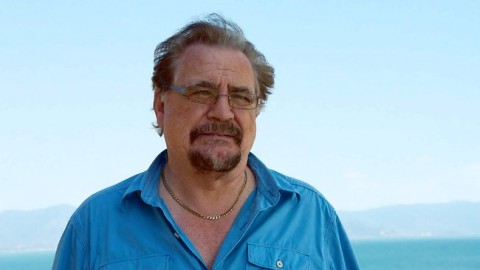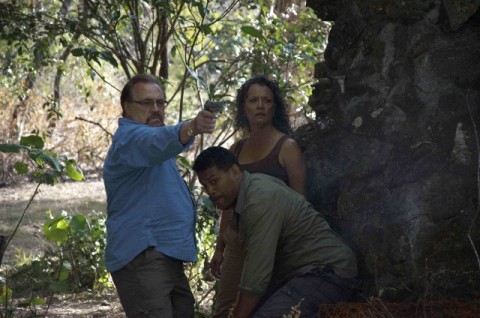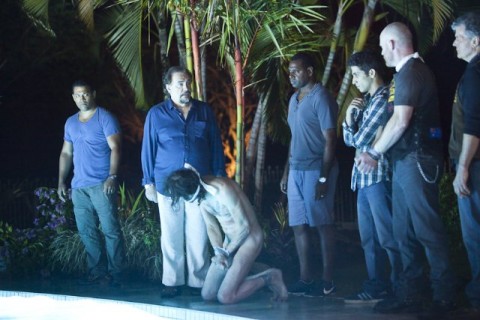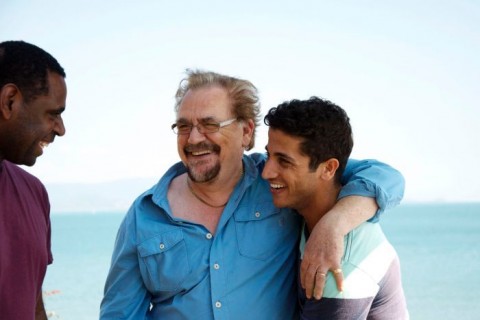The Light from the TV Shows: A Chat with Brian Cox (“The Straits”)
The watching of one’s favorite programs has increasingly stretched beyond the TV set and onto the internet, with various online viewing outlets providing exclusive programming for its subscribers. In the case of Hulu, Stateside viewers suffering from Anglophilia have been particularly excited about seeing a flurry of programming from the UK turning up, but now they’re starting to bring us a few treats from down under as well.
The crime-family drama “The Straits,” starring Brian Cox, who you probably know from “Manhunter” or “Braveheart” or possibly even “Super Troopers,” premiered on Hulu a few days back and will be doling out a new episode every week, but once you’ve started watching, between the dialogue, the action, the humor, and, sure, the sex and violence, too, you’ll find that a week will seem like a bloody lifetime.
Bullz-Eye was fortunate enough to chat with Cox about his new endeavor, not to mention a few other highlights from his none-too-shabby back catalog, but be forewarned: he’s been talking about “The Straits” in the past tense for awhile now – it premiered in Australia back in February – so you’ll see that he has a tendency to slip up and offer spoilers on occasion. Not that they’ll stop your overall enjoyment of the series, but just don’t say we didn’t warn you.

Bullz-Eye: Well, I didn’t have enough lead time to absorb all 10 episodes of “The Straits,” but I’ve knocked out three of them thus far, and I’m really enjoying it.
Brian Cox: Well, good! Good, good, good. [Laughs.] It’s a good show!
BE: It is. A nice blend of drama, a bit of humor here and there, and certainly some darkness.
BC: Yeah, it’s got a black-comedy effect about it.
BE: So how did “The Straits” fall into your lap? Did they approach you directly?
BC: They did! They got in touch. I was doing “That Championship Season” on Broadway, and I just got this call from my English agent…because I have agents here and I’ve got agents in England…and they said, “How do you feel about going to Australia?” And the irony was that I’d been trying to get Australia for about the last four or five years, and I’m thinking, “Well, it’s only ever gonna be a job that gets me out there.” So when I got this call, I said, “I’ll do it! I don’t care what it is. I’m desperate to go to Australia!” [Laughs.] Then they said, “Well, hang on, read the script!” And I read the script, and I said, “Well, this is even better: a great job, a great role, and I get to go to Australia! This is a must!” So my wife came and my kids came, and it was a fantastic opportunity, one which I cherish. And I’m very sad that we’re not going to do some more of it, because I do think we were just…you know, the potential of it is enormous. But they’re a little nervous about it, because it’s about a crime family. But what I love about this show and what I love about Australia…
Australians are very slow-moving. You know, they kind of move at their own pace, and they aren’t really rushed, so it kind of took a long time to get this show out there, and then they finally got it out, and then it took them a long time to decide that they weren’t going to do it again this year. Because we were all set and ready to do it. But the thing about it is that it is a pioneering country, and television is in a pioneering state. You know, they’re doing a lot of great stuff now on Australian television. Australians have really asserted themselves as actors. I mean, I’m of a generation where I remember when all of the Australian actors used to live in England, and then they all went back in their forties. And now Australia is ripe for everything, and people live there. Cate Blanchett lives there. Russell Crowe lives there. My great friend Hugo Weaving lives in Sydney. So I just admire the Australians so much, and I admire what they’ve done, and now with the link with New Zealand and “The Hobbit” and Peter Jackson, it’s kind of an industry all of its own, and quite rightly. But it’s still very much pioneering. And this series is quintessentially about that whole element. It’s like the Wild West, you know? The Torres Strait is like South Dakota in the 1870s. It’s still like that.

BE: It sounds as though you’d been to Australia prior to doing this series, if not in some time, but had you ever been to the Torres Straits before?
BC: No, and I’ve never got the Torres Straits since then, either, unfortunately. My filming never got me there, which I was sad about. I was told I was gonna go to the Torres Straits, but…it’s actually rather expensive. And then we shot a lot of the stuff on the mainland. We shot it in an aboriginal settlement just south of Cairns, which is absolutely stunning. And it’s also where the last man to be eaten as a cannibal act in Australia was eaten. [Laughs.] We shot there. We did the big shootout…wait, how many episodes have you seen?
BE: Only three thus far.
BC: Oh, so you haven’t seen that yet. Yeah, sorry about that. [Laughs.] But, yeah, we shot that there. And a couple of the boys did actually go out and shoot in the Torres Straits, so there was quite a lot of shooting there. And they’re amazing. I mean, I’ve seen a lot of footage on it, so I know the area. And I went up to Cape Tribulation (in Queensland), and I went up to the top of Australia, and I went to the Daintree. So it was a great time. A great, great time.
BE: I understand that “The Straits” was originally intended as a miniseries rather than an ongoing series. When it was pitched to you, were you presented with the script for the project in its entirety or just the pilot?
BC: I got the first three scripts. And then because of my availability…they wanted me in it, and, actually, as it turned out, I could’ve been there for the whole thing after all, but then they had this whole sequence where I’m shot… [Hesitates.] Ugh. I don’t want to give it away! But, anyway, I’m shot, and I’m in a coma for a bit, and then I come out of it, and then I’m okay. I love the dialogue, by the way. They’re such good dialogue writers. And it was just so terse, so completely on the money. And witty. And Harry was just one of these great characters. He was a great creation.

BE: The point of reference a lot of critics have used is “The Sopranos,” but for those not limiting themselves to U.S. television, “Underbelly” is a good one as well. What comparisons struck you as you first read it?
BC: Well, first of all, yes, “Underbelly,” certainly. Of course, it came to my mind that Tony Soprano and Harry Montebello…they’re kissing cousins, in a way. Although Harry’s older. And Harry’s also…I mean, you know, it’s not the Italian way, it’s the island way, and Harry’s an outsider to the island. He’s an outsider, but he’s been tolerated because he’s played ball. And things are starting to go wrong, so now he’s going back to his old culture. His back story is that he was a hit-man for the Krays, which was a famous gang group in the ‘60s and ‘70s in London, and he went on the run. And ended up in Australia, met this beautiful island girl, and married her, and he didn’t realize that she was sort of the heiress apparent to this big chief of this island. And he married thinking he was going to have kids, but she was actually childless. And then they started to adopt these children, and…that’s a common thing in these islands: some people don’t have children, some people have large families, and they share the families out. They give the families to those who are childless. It’s very common. It’s a thing that they do. So it all becomes about the community.
But, you know, they have their problems. Particularly health issues. I think it’s the highest rate of diabetes in the world, in the Torres Straits. It’s the food, because they love this Southern fried chicken. They love KFC! And they pay a fortune for it. But it’s bad for them, just as it’s bad for the aboriginals in Australia. Their rate of diabetes is ridiculously high as well. And you see these kids eating this horrible processed food, and…these are an ancient people! These are a people who are still in the hunting-and-gathering stage. Australia’s still like that. It still has that element.

I saw this fantastic documentary about these guys who put out fires, and there’s this old guy…I can’t remember his name, but he’s fantastic. He’s an old abo, and he had all these people coming up from Melbourne, in their fire trucks and their outfits, and he’s going [Doing an aboriginal accent.] “Why you wearing all that stuff? You don’t need all stuff. Get all that stuff off. Just get in the shorts and the jacket!” The documentary was about how you put out fires as well as how you make fires, and how you don’t allow the fires you’ve made to burn beyond a certain level, because once it does, that’s when fires go crazy. And this old abbo, he could light a fire, he could clear a piece of ground and show where it stopped. He would light a fire so it went to that point. But not only that, you would look at the ground and see little green shoots that his fire had avoided, which was fresh stuff coming up. He burned it in such a precise way. And they’re doing this in shorts and sandals! These big sort of Aussies are in their firefighting outfits, they’re kind of scratching their heads and going, “How did they do that?” And at one point he sees an old tree and says, “Now, there’ll be water in that tree.” The guy says, “No, not possible.” He says again, “There’ll be water in that tree.” “Can’t be. It’s been burned.” He takes a machete, he cuts it…and this huge spout of water comes out. It was astonishing. Now that’s their culture. That’s who they are.
That’s the extraordinary part about Australia. And those ways, they’re still prevalent. And slowly the aboriginals are getting their rights back, but…it’s an ancient land, and it’s the most incredible place. It really is. Australians don’t even know about it. So when you do get a series like “The Straits,” you’re in a very privileged position, because it is pioneering. In terms of television, in terms of drama, but also in terms of dealing with and showing the culture, and how they’re having to adjust to European ways, which are detrimental to them.
BE: You made things sound pretty ominous for the future of the series at the top of our conversation, but given that it’s just now debuting on Hulu, is it feasible that its success there could yet result in a second season of “The Straits”?
BC: Well, if it’s a success on Hulu, then there will be. And I do think it needs to see world success. I think it’s got the potential. I’m certainly up for it. In fact, I loved doing it. But, then, I just love working in Australia.
For me, though, and at my time of life, you’re always in for the reinvention, because you don’t want to go on the same way infinitely. I’ve always tried to keep ahead of the times and tried to go into new ventures. I’ve never sat still. I mean, I’m sitting now. [Laughs.] I’m sitting in my little aviary in Brooklyn, looking out at the Freedom Tower, 50+ floors up, in my reasonably small apartment. Mind you, it’s a far cry from the house I used to have in L.A., which was 5,000 square feet. But, actually, it was meaningless. I mean, this is a bit tight, but…that’s the actor’s way, you know? We’re still the strolling player.
I’ve spent very little time here this year, because I’ve been involved in the UK, doing a whole series on addiction, funnily enough. I’ll be presenting this series of documentaries on addiction, which fascinates me. It’s all about sugar, tobacco, whiskey, and opium. I spent most of the year doing that. I think I’ve only been home maybe four weeks this year. My kids don’t like it. My little boy said to me, “Listen, Dad, you’ve got to stay more in New York. This is no good. It’s just no good!” I said, “Well, you know, I’ve got to go where the money is. I’ve got to earn the money.” He says, “Dad, you’ve got a credit card!” [Laughs.]
BE: As far as your back catalog goes, do you have a favorite project you’ve worked on over the years that didn’t get the love you thought it deserved?
BC: [Long pause.] Oh, yes.
BE: Or possibly more than one.
BC: Oh, yeah, definitely more than one. [Laughs.] Things that were controversial, things which have achieved cult status. I’ve done more cult films…I mean, my retrospective…I’ll tell you, when I go, I’m gonna have the best retrospective of anyone, given the catalog of stuff I’ve done. It’s just been very special. I did a film in Iceland called “The Good Heart,” which I think is a wonderful film, with Paul Dano. I also did “L.I.E.” with Paul, which had relative success, but because it was dealing with pedophilia, it didn’t have a wide range of success. There’s a film called “Running with Scissors” that I made, with Ryan Murphy, who created “Glee.” He directed it – it was his first movie – and I think it was a wonderful movie. And, again, people will look at that movie in a few years and say, “How did we let this escape us?” But that’s ‘cause Sony buggered about. Studios always bugger about with something, you know. I tend to do studio films and then do independents, and one kind of subsidizes the other.
BC: Another film I did was a British film called “The Escapist,” which I helped produce.
BE: I actually own that film.
BC: Do you?
BE: I do!
BC: I’m glad to hear that. I think it’s a very good film, and I’m very proud of it. And, of course, Rupert (Wyatt) has gone on to bigger things.
BC: Oh, and there’s one other film: “Red.” But not the “Red.” I think I’ve made more films called “Red” than anybody. [Laughs.] I’ve made about five films called “Red.” I’ve even just made “Red 2”! But this “Red,” it’s a Jack Ketchum story about a guy whose dog is killed – I did it with Tom Sizemore – and he just seeks some sort of reparation for it. Actually, he just needs some acknowledgement. He’s not even after anything. But then it comes into a revenge drama and blows up, and…it’s a really interesting film.
So, you know, there’s a lot of movies out there. And there’s a lot of movies that you wish they’d forget about as well. [Laughs.] Actually, there’s not too many of them. I’ve actually been quite good in that way. My career’s been quite good to me.
BE: You mentioned that you’ve been in more cult films than just about anybody, but you’ve also got such a diverse group of films to call your own, everything from “Super Troopers” to “X2.”
BC: Exactly! Well, you know, with “Super Troopers,” the proof is in the…you know, you get reviews where, like, I think it was the Sunday Times in London that said, “If Mr. Cox needed the money for doing this piece of nonsense” – this was for “Super Troopers” – “then I’m sure friends could’ve come to the rescue.” [Laughs.] And you go, “Well, you got it wrong.” Because that film has a following among the kids that’s second to none! I mean, I remember going to a place called Eddie Z’s in Austin, it’s a steakhouse, and the kids, all the waiters could quote endlessly from “Super Troopers.” They knew it backwards and forwards.
BE: Do you find that’s the film that’s quoted back to you the most?
BC: Yeah. That, and “Manhunter.” You know, “I will send you something wet,” that comes. And “Braveheart,” of course. I get, “First, learn to use this, then I’ll teach to you use this.” So, yeah, “Braveheart” is one I get a lot of. I’ve had a lot of ‘em over the years. [Hesitates.] My phone’s just beeped, which means I may be about out of battery.
BE: Well, I’ll wrap quickly, then. But I did just want to ask out of curiosity how you came to provide the voice of the Elder Ood on “Doctor Who”?
BC: Now, that’s a very interesting story, and I’ll tell you what happened, because it was kind of odd, but…I thought I was doing an advert for “Doctor Who.” [Laughs.] I didn’t think I was actually doing the show. I thought I was just doing a voiceover. Because they came through my voiceover agent, you see, and they said, “We’ve got you doing this thing,” and I said, “What is it?” And they told me it was a bit of voice acting, so I said I’d do it. But we, uh, never read the fine print on it.
So I arrive in the studio, and the very nice director (Euros Lyn), a young man who was from Slovenia, I believe, or one of those places, he was sitting down there, and he said, “Now, I think this character…” And I go, “What character?” He said, “The Ood.” And I went, “Oh,” but I was thinking, “I didn’t realize I was playing a part.” I had no idea! But, anyway, I just suddenly decided, “Oh, to hell with it, okay.” So I didn’t say anything. I just did it, and that was it. So that’s how I came to do the Ood. It was complete absentmindedness on my part. Even as I did it, I thought, “I shouldn’t be doing this,” because it was a performance. It should’ve come through my other agent, but because it came through my voiceover agent…I really should’ve gotten more money for it! [Laughs.] So I got screwed for not being attentive enough.
BE: Lastly, just to clear up a longstanding rumor, were you really an uncredited extra in episodes of “The Prisoner”?
BC: No, it’s one of the great myths. [Laughs.] It’s on Wikipedia, and I keep wanting to sort it out, but, no, I was never in “The Prisoner.” I would’ve loved to have been in “The Prisoner,” and I remember seeing it, and I watched it when it first came out. I’m old enough to have seen it and watched it and, yes, to have been an extra in it. But I never was. I don’t know where that came from. I did actually film in Portmeirion maybe 10 or 15 years ago, where they made “The Prisoner” and which is an extraordinary place. But, no, I was never in “The Prisoner.” So perhaps you can finally help me lay that one to rest! [Laughs.]
Related Posts
Comments Off on The Light from the TV Shows: A Chat with Brian Cox (“The Straits”)
Posted in: Entertainment, Interviews, News, Television
Tags: Braveheart, Brian Cox, Doctor Who, Euros Lyn, Hulu, L.I.E., Manhunter, Paul Dano, Red, Running with Scissors, Rupert Wyatt, Ryan Murphy, Super Troopers, That Championship Season, The Escapist, The Good Heart, The Light from the TV Shows, The Prisoner, The Sopranos, The Straits, Tom Sizemore, Underbelly, Will Harris, X2








